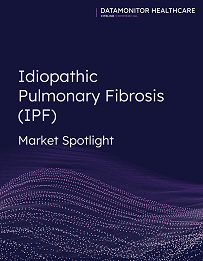Report Library
All Reports
Datamonitor Healthcare Respiratory: Idiopathic Pulmonary Fibrosis (IPF) Market Spotlight
October 01, 2025
Idiopathic pulmonary fibrosis (IPF) is a chronic disease in which scarring and thickening of the lung tissue occurs due to unknown causes, impairing pulmonary function. Several different theories have been proposed for the exact pathogenesis of IPF, although the most commonly held hypotheses share a general flow of events. IPF is thought to begin with repetitive alveolar epithelial cell injury and apoptosis possibly caused by genetic variations, environmental exposures, viral infections, aging, gastroesophageal reflux disease (GERD), or other factors. This leads to an aberrant wound healing response and the release of pro-fibrotic cytokines such as transforming growth factor-beta and platelet-derived growth factor. Consequently, myofibroblasts accumulate in areas called fibroblast foci through the migration and differentiation of local fibroblasts, recruitment of circulating fibrocytes, and/or a de-differentiation process called epithelial-to-mesenchymal transition. Myofibroblasts are responsible for the deposition of collagen and extracellular matrix proteins, which in excess not only compromise lung capacity and blood-gas exchange, but also promote further fibrotic activity.
This Datamonitor Healthcare report contains a Market Spotlight module.
| Indications Covered: | Idiopathic Pulmonary Fibrosis (IPF) |
